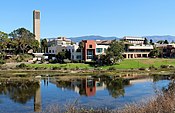University of California, Santa Barbara College of Engineering
 | |
| Type | Public |
|---|---|
| Established | 1966 |
Parent institution | University of California, Santa Barbara |
| Dean | Umesh Mishra |
| Location | , U.S. |
| Website | https://engineering.ucsb.edu/ |
The College of Engineering (CoE) is one of the three undergraduate colleges at the University of California, Santa Barbara.
As of 2021, there were approximately 150 faculty, 1,650 undergraduate students, and 750 graduate students.[1] According to the Leiden Ranking, engineering and physical sciences at UCSB is ranked #1 among public universities for top 10% research citation impact.[2] According to the National Research Council rankings, the UCSB engineering graduate research program in Materials was ranked #1 and Chemical Engineering ranked #5 in the nation among public universities.[3]
Departments and programs
The College of Engineering comprises the following departments:[4]
- Chemical Engineering (established in 1965)
- Computer Science (established in 1979)
- Electrical and Computer Engineering (established in 1962)
- Materials (established in 1987)
- Mechanical Engineering (established in 1964)
- Technology Management (established in 2022)
The college is connected to the UCSB campus through innovative multi-disciplinary/outreach academic programs:[5]
- Biological Engineering Program (BioE)
- Computational Science and Engineering Program (CSE)
- Media Arts and Technology Program (MAT)
Research units
One of the strengths of the College of Engineering is its ability to cross traditional academic boundaries in collaborative research. Much of this work is conducted in collaboration with UCSB's interdisciplinary research centers and institutes, which include:[6]
- American Institute for Manufacturing Integrated Photonics (AIM Photonics) in collaboration with SUNY Polytechnic Institute.
- California NanoSystems Institute
- Center for Bio-Image Informatics
- Center for Control, Dynamical-Systems, and Computation
- Center for Information Technology and Society
- Center for Nanotechnology in Society
- Center for Stem Cell Biology and Engineering
- Complex Fluid Design Consortium
- Dow Materials Institute
- Institute for Collaborative Biotechnologies
- Institute for Multiscale Materials Studies
- Institute for Energy Efficiency
- Interdisciplinary Center for Wide Band-Gap Semiconductors
- Materials Research Laboratory
- Mitsubishi Chemical Center for Advanced Materials
- National Nanofabrication Infrastructure Network
- Optoelectronics Research Group
- Solid State Lighting and Energy Electronics Center
- UCSB Nanofabrication Research Center
Academics
Undergraduate programs
The college offers the B.S. degree in chemical engineering, computer engineering, computer science, electrical engineering, and mechanical engineering.[7] The B.S. programs in chemical engineering, electrical engineering, and mechanical engineering are accredited by the Engineering Accreditation Commission of Accreditation Board for Engineering and Technology (ABET). The computer science B.S. program is accredited by the Computing Accreditation Commission of ABET.
Jointly with the Department of Computer Science and the Department of Electrical and Computer Engineering, the college offers undergraduate degree in computer engineering.[8]
The curriculum for the undergraduate programs is designed to be completed in four years.
Graduate programs
The college offers M.S. and Ph.D. degrees in chemical engineering, computer science, electrical & computer engineering, materials science, and mechanical engineering.[9] It also offers graduate programs in technology management, bioengineering, biomolecular science & engineering, and media arts & technology.[10]
Faculty
The college has 150 faculty members, most of whom are involved in interdisciplinary research and academic programs. Twenty-nine faculty members are in the National Academy of Engineering and nine are elected to the National Academy of Sciences.[11] Three faculty members have won the Nobel Prize. Alan J. Heeger, Professor of Physics and of Materials, won the 2000 Nobel Prize in Chemistry "for the discovery and development of conductive polymers", Herbert Kroemer, Professor of Electrical and Computer Engineering and of Materials, won the 2000 Nobel Prize in Physics "for developing semiconductor heterostructures used in high-speed and opto-electronics".[12] In 2006 Shuji Nakamura, a professor of Materials and Computer Engineering, won the Millennium Technology Prize for developing blue, green, and white LEDs and the blue laser diode as well as receiving a 2014 Nobel Prize in Physics for his contribution to the invention of blue light-emitting diodes.[13][14] In 2015, Professor Arthur Gossard was awarded the National Medal of Technology and Innovation by the Obama Administration.
Publications
Convergence is the magazine of Engineering and the Sciences at UC Santa Barbara. Sponsored by the College of Engineering and the Division of Mathematical, Life, and Physical Sciences in the College of Letters and Science, Convergence was begun in early 2005 as a three-times-a-year print publication, with the goal of bringing stories of interest from engineering and the sciences to the desks and coffee tables of a wide range of alumni, friends, partners, funding agencies, corporations, donors and potential supporters. This publication prints annually.
See also
References
- ^ "About UCSB Engineering". University of California, Santa Barbara. Retrieved 2016-07-19.
- ^ "CWTS Leiden Ranking". Academic Ranking of World Universities. Retrieved 2016-07-19.
- ^ "National Academies Research Doctorate Programs, Assessment of Research Doctorate Programs". National Academies. 2010-09-28.
- ^ "Departments". University of California, Santa Barbara. Retrieved 2008-07-27.
- ^ "College of Engineering - UC Santa Barbara | | College of Engineering, UC Santa Barbara. The convergence of research and innovation".
- ^ "Facts Brochure" (pdf). University of California, Santa Barbara. Retrieved 2008-10-20.
- ^ "UCSB Engineering Undergraduate Programs". University of California, Santa Barbara. Retrieved 2016-07-19.
- ^ "Computer Engineering Program Overview". University of California, Santa Barbara. Retrieved 2008-11-03.
- ^ "UCSB Engineering Graduate Programs". Retrieved 2016-07-19.
- ^ "UCSB Engineering Graduate Programs". University of California, Santa Barbara. Retrieved 2016-07-19.
- ^ "UCSB Engineering Points of Pride". University of California, Santa Barbara. Retrieved 2016-07-19.
- ^ "UCSB Nobel Laureates". University of California, Santa Barbara. Retrieved 2008-07-31.
- ^ "Faculty Profile: Shuji Nakamura". University of California, Santa Barbara. Retrieved 2016-07-19.
- ^ "Top prize for 'light' inventor". BBC News. September 8, 2006. Retrieved 2008-07-31.

